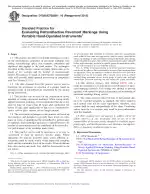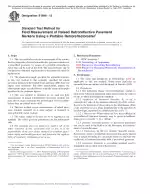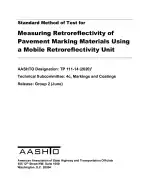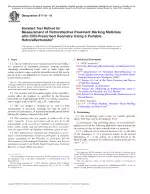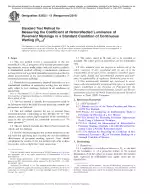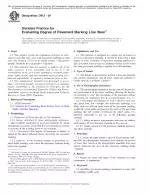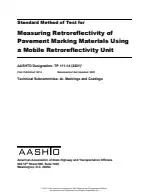ASTM D7585/D7585M-10 (R2015) PDF Download
Standard ENStandard Practice for Evaluating Retroreflective Pavement Markings Using Portable Hand-Operated Instruments
Also Known As:
ASTM D7585/D7585M-10 (R2015) is a standard practice that provides procedures for evaluating the retroreflective performance of pavement markings. The standard does not specify minimum retroreflectance values for pavement markings but instead outlines sampling criteria for determining their retroreflective properties. This information can then be used to determine compliance with a specific specification, with the responsibility of setting acceptable retroreflectivity values lying with the agency having jurisdiction.
The practice emphasizes the importance of ensuring that the markings being evaluated are clean and dry. While the standard does not address all concerns related to contamination of the markings, it provides guidance on inspecting and selecting areas that are representative of the marking section, avoiding areas with paint tracking or contamination. Techniques such as pressure washing, brushing, and high-pressure air can be used to remove loose dirt, but packed dirt may require more specialized methods. Photographs taken with a digital camera and a macro lens can help visualize contamination on or between the glass beads.
The standard also describes various field techniques for evaluating retroreflective properties, including sampling criteria, test section length, and the number of measurements needed. These techniques rely on portable hand-operated instruments and comply with the Test Method E1710. The data obtained through these techniques can be used to determine the acceptance or rejection of a project based on specified levels of retroreflectivity established by the agency having jurisdiction. The practice can be applied to both newly installed and existing pavement markings, with recommended evaluation timings provided.
Overall, ASTM D7585/D7585M-10 (R2015) provides a comprehensive framework for evaluating the retroreflective performance of pavement markings. It offers flexibility for agencies to customize the practice to meet their specific needs and documents areas where different assumptions could be made, impacting sampling requirements and confidence levels. The standard replaces Test Method D6359, introducing a multi-level strategy for evaluating retroreflectance and providing options for project acceptance and monitoring of pavement markings during service.
| Descriptors | retroreflectivity, portable retroreflectometers,Reflectance and Reflectivity,Retroreflective Pavement Markers,Retroreflectometers,Roads,Sampling |
| ICS Codes | 93.080.20 - Road construction materials |
| Language(s) | English |
| File Size | 122.9 KB |

